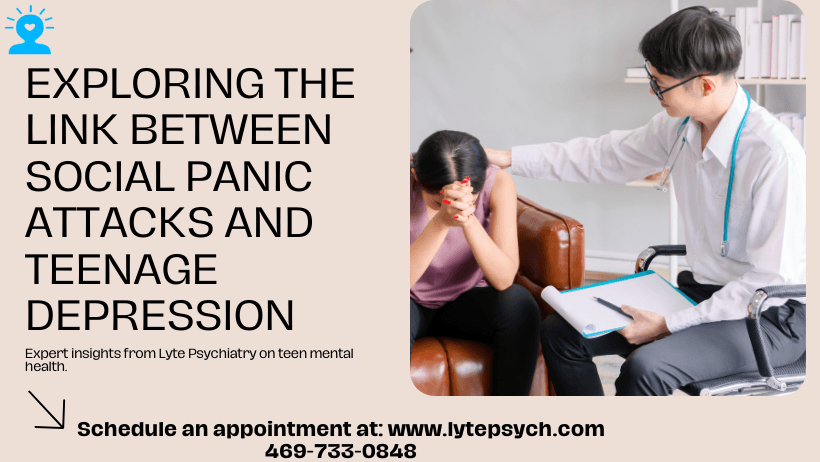Tue May 21 2024
The Link Between Social Panic Attacks and Teenage Depression at Lyte Psychiatry (Best Adults and Adolecents Psychiatrist and Therapist) Best Psychiatris and Therapist, Dallas Fort Worth, TX

Teenage Depression in Adolescents: Signs, Symptoms, and Solutions with Lyte Psychiatry (Best Adults and Adolescents Psychiatrist and Therapist Near You)
Social panic attacks can be daunting experiences, especially for teenagers who are already grappling with the challenges of adolescence. The intersection of social anxiety and panic attacks can significantly impact a teenager's mental health, leading to conditions like depression.
What Are Social Panic Attacks?
Social panic attacks, also known as panic attacks with a social trigger, occur in situations where individuals feel exposed to scrutiny or judgment by others. These attacks can manifest in various forms, including rapid heartbeat, shortness of breath, sweating, trembling, and a sense of impending doom. For teenagers, social interactions are crucial for identity formation and social integration, making them particularly vulnerable to the impact of social panic attacks.
The Link Between Social Panic Attacks and Teenage Depression
Social panic attacks can exacerbate existing mental health issues or lead to the development of new ones, such as depression. The constant fear of experiencing a panic attack in social settings can isolate teenagers, leading to feelings of loneliness, low self-esteem, and hopelessness. Over time, these negative emotions can culminate in depression, further hindering the teenager's ability to function and thrive.
Understanding the Cycle of Social Panic Attacks
The cycle of social panic attacks and teenage depression can be vicious. A teenager experiences a panic attack in a social situation, leading to avoidance behaviors to prevent future attacks. However, avoidance only reinforces the fear and anxiety associated with social interactions, exacerbating the problem. As social isolation deepens, so does the risk of depression, creating a downward spiral that can be challenging to break.
Strategies for Addressing Social Panic Attacks and Teenage Depression
Psychoeducation: help, and adopt copin Educating teenagers about the nature of social panic attacks and depression can help demystify these conditions and reduce stigma. Knowledge empowers teenagers to recognize symptoms, seek g strategies.
Cognitive-Behavioral Therapy (CBT): CBT is a proven therapeutic approach for treating both social anxiety and depression. By challenging negative thought patterns and gradually exposing teenagers to feared social situations, CBT equips them with the tools to manage anxiety and build resilience.
Lifestyle Modifications: Healthy lifestyle habits, such as regular exercise, balanced nutrition, adequate sleep, and stress management techniques, can help alleviate symptoms of both social panic attacks and depression.
Professional Intervention: In severe cases, professional intervention may be necessary. Psychiatric evaluation and medication management can complement therapy in addressing underlying biological factors contributing to social panic attacks and depression.
Schedule an Appointment with Lyte Psychiatry to Help Manage Your Teenage Depression (Affordable Therapist and Psychiatrist Near You)
If you recognize any of these symptoms or if they interfere with your teenager life, consider reaching out to Lyte Psychiatry for professional help. Our team is dedicated to providing personalized care tailored to your unique needs. Contact us today to learn more about how we can help you manage your anxiety and improve your mental health.
To Schedule an appointment. Click Here
To see our services. Click Here
Call us if you have questions at 469-733-0848
FAQ
Q: What causes teenage depression?
A: Teenage depression can be caused by a combination of genetic, environmental, and psychological factors. Stressful life events, trauma, family history of depression, and imbalances in brain chemistry can all contribute to the development of depression in teenagers.
Q: How is teenage depression treated?
A: Cognitive-behavioral therapy (CBT) and interpersonal therapy (IPT) are commonly used therapeutic approaches. Antidepressant medications may also be prescribed by a psychiatrist.
Q: Is teenage depression a sign of weakness?
A: No, teenage depression is not a sign of weakness. It is a mental health condition that can affect anyone, regardless of their strength or character.
Q: Can teenage depression go away on its own?
A: Without treatment, teenage depression can persist and worsen over time. It's important to seek help if you or someone you know is struggling with depression.